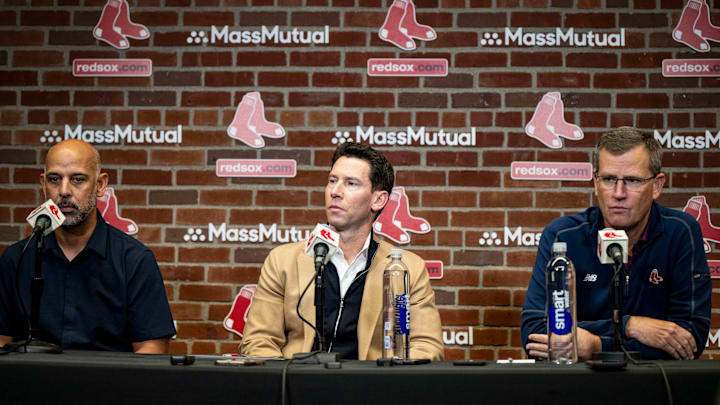The Rafael Devers chapter in the history of the Boston Red Sox has officially been closed. The final months of his tenure with the club were tumultuous, with him being publicly critical of the front office multiple times since the start of spring training.
Let's be clear: nobody in this situation is absolved of blame, player, coaches, front office, or ownership. Everybody receives a piece of the blame pie, but the piece is bigger for some than it is for others.
The first person who should be looking at himself in the mirror in this situation is Alex Cora. The entire offseason, he campaigned for the Sox to sign Alex Bregman, but that wasn't the root of the problem. Cora repeatedly said Bregman would play second base.
Cora immediately backtracked once Bregman was signed, saying that there was no official plan to play Bregman at second base, and it was too early to decide where he'd play. Ultimately, the Red Sox moved Devers off third base, creating the first media firestorm of the season.
Trying to pinpoint which influential member of the Red Sox is to blame for the Rafael Devers debacle
Of course, this wasn't only on Cora, the front office has to take some of the blame for this as well, but had Cora or Craig Breslow been more open about their pursuit of a replacement for Devers at third (they were also trying to trade for Nolan Arenado) this whole situation may have played out completely different.
Devers also shoulders a part of the blame for this entire situation. Though the front office communicated with him poorly, if at all, at times during the offseason and into the season, Devers put himself first. He made a point to say he didn't want to be the DH, even though he eventually did do it. When asked to play first after Triston Casas' season ended due to a ruptured patellar tendon on May 2, he refused again and again went to the media to complain.
Sam Kennedy and Craig Breslow went out of their way to not bash Rafael Devers on his way out the door Monday. But they didn't sugarcoat things, either.
— Chris Cotillo (@ChrisCotillo) June 17, 2025
“As we think about the identity, culture and environment that is created by great teams, there was something amiss here."…
This prompted an impromptu flight to Kansas City by John Henry, Sam Kennedy, and Breslow. Henry had a closed-door meeting with Devers and Cora. The content of the meeting never made it out of that room, but reports suggest Henry wanted Devers to do as the team asked, and he never did.
The team made it clear in the post-trade press conference, that him being a team player was important to the organization. Him setting a good example for the young core of players coming up was important.
Devers didn't deliver the off-the-field things the club expected from their franchise player. Agree with the organization or don't, they write the checks, they make the decisions, and they didn't believe he was fulfilling his end of the bargain, and that's on him.
The final piece of the puzzle is the front office, specifically Breslow. Ultimately, he bears most of the blame for this. His lack of communication with Devers about their pursuit of a new third baseman was what initially disgruntled him.
Then, once Casas went down, the lack of a true succession plan was what prompted them to ask Devers to learn first after telling him they didn't want him in the field. If they had a player they were comfortable sliding into that spot, they may never have had to ask Devers to play first.
Breslow took too many missteps throughout this whole process and he shoulders the brunt of the blame for this. His legacy as Chief Baseball Officer of the Red Sox will always be stained by this trade and the mismanagement of this situation.
